Related Research Articles
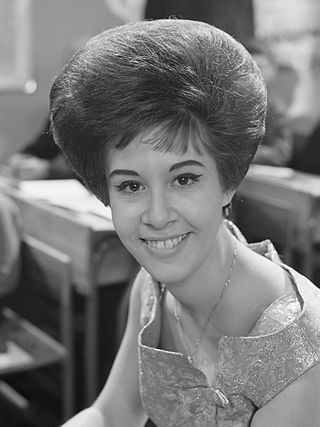
Helen Kate Shapiro is a British pop and jazz singer and actress. While still a teenager in the early 1960s, she was one of Britain's most successful female singers. With a voice described by AllMusic as possessing "the maturity and sensibilities of someone far beyond their teen years", Shapiro recorded two 1961 UK chart toppers, "You Don't Know" and "Walkin' Back to Happiness", when she was just 14 years old.
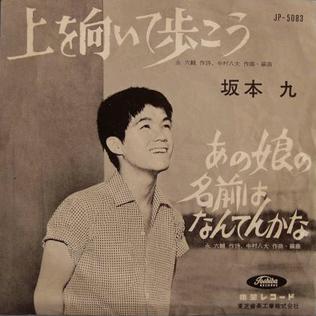
"Ue o Muite Arukō", alternatively titled "Sukiyaki", is a song by Japanese crooner Kyu Sakamoto, first released in Japan in 1961. The song topped the charts in a number of countries, including the U.S. Billboard Hot 100 in 1963.
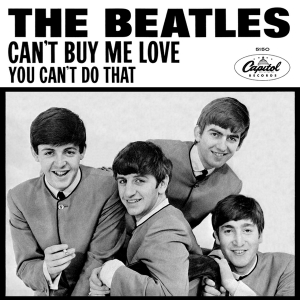
"Can't Buy Me Love" is a song by the English rock band the Beatles that was released in March 1964 as the A-side of their sixth single. It was written by Paul McCartney and credited to the Lennon–McCartney partnership. The song was included on the group's album A Hard Day's Night and was featured in a scene in Richard Lester's film of the same title. The single topped charts in the United Kingdom, the United States, Australia, Ireland, New Zealand and Sweden. In the UK, it was the fourth highest selling single of the 1960s.

"You Keep Me Hangin' On" is a song written and composed by Holland–Dozier–Holland. It was first recorded in 1966 by American Motown girl group the Supremes, reaching number one on the Billboard Hot 100. American rock band Vanilla Fudge released a cover version in June the following year, which reached number six on the Billboard Hot 100. English singer Kim Wilde covered "You Keep Me Hangin' On" in 1986, reaching number one on the Billboard Hot 100 in June 1987. In the first 32 years of the Billboard Hot 100 rock era, "You Keep Me Hangin' On" became one of the six songs to reach number one by two different musical acts. In 1996, American country singer Reba McEntire's version reached number two on the US Billboard Hot Dance Club Play chart. The BBC ranked the Supremes' original song at number 78 on The Top 100 Digital Motown Chart, which ranks Motown releases by their all-time UK downloads and streams.

"Lola" is a song written by Ray Davies and performed by English rock band the Kinks on their 1970 album Lola Versus Powerman and the Moneygoround, Part One. The song details a romantic encounter between a young man and a possible trans woman or cross-dresser, whom he meets in a club in Soho, London. In the song, the narrator describes his confusion towards Lola, who "walked like a woman but talked like a man".

"Please Please Me" is a song released by the English rock band the Beatles. It was their second single in the United Kingdom, and their first in the United States. It is also the title track of their first LP, which was recorded to capitalise on the success of the single. It is a John Lennon composition, although its ultimate form was significantly influenced by producer George Martin.

"Jive Talkin' " is a song by the Bee Gees, released as a single in May 1975 by RSO Records. This was the lead single from the album Main Course and hit number one on the Billboard Hot 100; it also reached the top-five on the UK Singles Chart in the middle of 1975. Largely recognised as the group's comeback song, it was their first US top-10 hit since "How Can You Mend a Broken Heart" (1971).
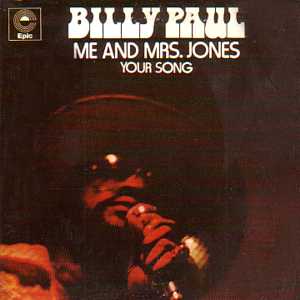
"Me and Mrs. Jones" is a 1972 soul song written by Kenny Gamble, Leon Huff, and Cary Gilbert, and originally recorded by Billy Paul. It describes an extramarital affair between a man and his lover, Mrs. Jones. In the song, the two meet in secret "every day at the same cafe", at 6:30, where they hold hands and talk. The two are caught in a quandary: "We got a thing going on/we both know that it's wrong/but it's much too strong/to let it go now."

"I Just Don't Know What to Do with Myself" is a song written by Burt Bacharach and lyricist Hal David.

"It's My Party" is a song by American singer-songwriter Lesley Gore from her debut studio album I'll Cry If I Want To (1963). It was released as the lead single from the album on April 5, 1963, by Mercury Records. The song was collectively written by Herb Wiener, John Gluck Jr., and Wally Gold, whilst production was helmed by Quincy Jones.

"Band of Gold" is a song written and composed by former Motown producers Holland–Dozier–Holland and Ron Dunbar. It was a major hit when first recorded by Freda Payne in 1970 for the Invictus label, owned by H-D-H. The song has been recorded by numerous artists, notably competing 1986 versions by contrasting pop singers Belinda Carlisle and Bonnie Tyler, and a 2007 version by Kimberley Locke.
"Don't Blame Me" is a popular song with music by Jimmy McHugh and lyrics by Dorothy Fields. The song was part of the 1932 show Clowns in Clover and was published in 1933. Popular versions that year were recorded by: Ethel Waters, Guy Lombardo, and Charles Agnew.
The discography of British rock and pop band the Hollies consists of 21 studio albums, 24 compilation albums, two tribute/covers albums, seven extended plays, and 67 singles.

"You Don't Own Me" is a popular song written by Philadelphia songwriters John Madara and David White and recorded by Lesley Gore in 1963, when Gore was 17 years old. The song was Gore's second most successful recording and her last top-ten single. On November 27, 2016, along with 24 other songs, the Grammy Hall of Fame announced its induction.

"Everybody's Talkin' (Echoes)" is a song written and recorded by American singer-songwriter Fred Neil in 1966 and released two years later. A version of the song performed by American singer-songwriter Harry Nilsson became a hit in 1969, reaching No. 6 on the Billboard Hot 100 chart and winning a Grammy Award after it was featured in the film Midnight Cowboy. The song, which describes the singer's desire to retreat from the harshness of the city to a more peaceful place and an easier life, is among the most famous works of both artists, and has been covered by many other notable performers.

"Me and You and a Dog Named Boo" is the 1971 debut single by Lobo. Written by Lobo under his real name Kent LaVoie, it appears on the Introducing Lobo album.
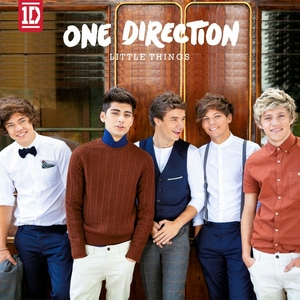
"Little Things" is a song by English-Irish boy band One Direction from their second studio album, Take Me Home (2012). It was released by Syco Music on 12 November 2012 as the record's second single. The song was written by Fiona Bevan and Ed Sheeran, and produced by Jake Gosling. Bevan brought the song to Sheeran's attention while he was in studio with the group in 2012, resulting in the band recording it. "Little Things" is a mid-tempo pop and folk ballad about the insistence that flaws are what make a person unique.
"Because They're Young" is an instrumental performed by Duane Eddy. It appeared on his 1960 album, $1,000,000 Worth of Twang.
Virginia Mazarro, known professionally as Ginny Arnell, is an American former pop and country music singer and songwriter who recorded in the late 1950s and early 1960s.

"Dumb Head" is a song recorded by American girl-pop performer Ginny Arnell. It was written by David Hess and Camille Monte, arranged by Al Gorgoni, produced by Jim Vienneau, and released in November 1963. The single was a minor hit, entering the Billboard Hot 100, and was featured on her debut full-length LP, Meet Ginny Arnell. British girl group The Sharades later recorded the song.
References
- ↑ "Tell Me What He Said", SecondhandSongs.com. Retrieved 19 October 2016
- ↑ Ginny Arnell, "Look Who's Talkin'", 45cat.com. Retrieved 19 October 2016
- ↑ Betts, Graham (2004). Complete UK Hit Singles 1952-2004 (1st ed.). London: Collins. p. 694. ISBN 0-00-717931-6.
- ↑ "Helen Shapiro – Tell Me What He Said" (in French). Ultratop 50.
- 1 2 "Billboard Magazine, April 21, 1962". Billboard. 21 April 1962.
- ↑ "Billboard Magazine, May 5, 1962". Billboard. 5 May 1962.
- ↑ Helen Shapiro - Flavour of New Zealand. Flavour of New Zealand
- ↑ "Helen Shapiro – Tell Me What He Said". VG-lista.
- ↑ "Helen Shapiro: Artist Chart History". Official Charts Company.
- ↑ "Offiziellecharts.de – Helen Shapiro – Tell Me What He Said". GfK Entertainment charts.